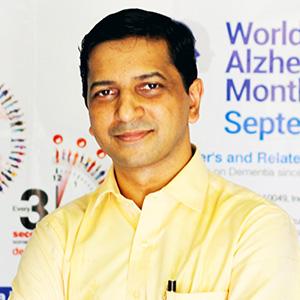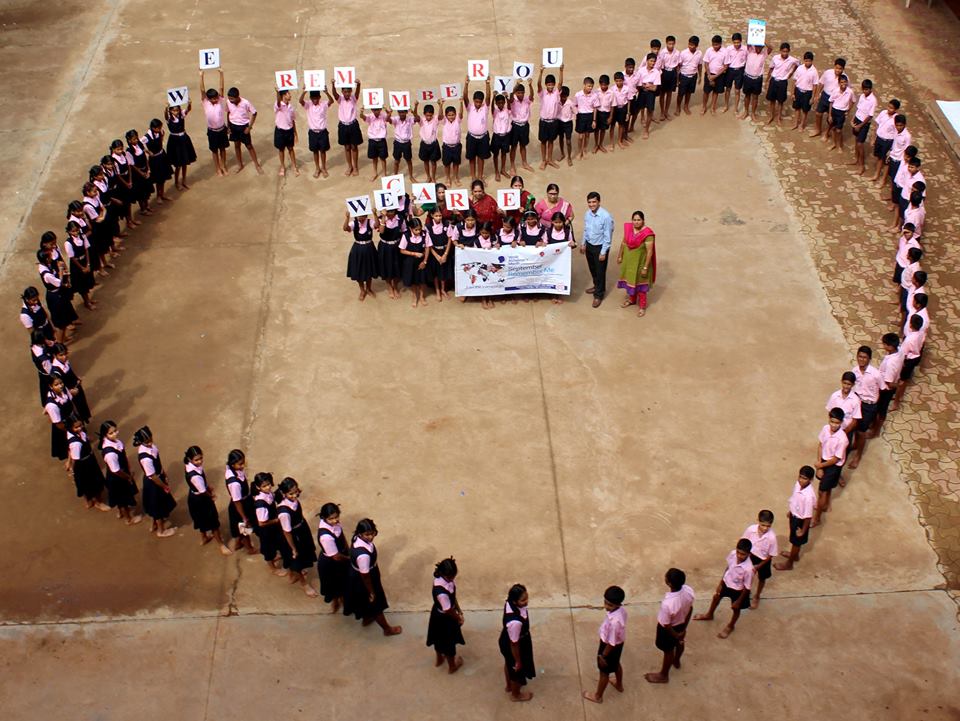
Every three seconds one person in the world develops dementia. Dr Amit Dias, an epidemiologist and geriatrician who is one of the leaders of the dementia awareness movement in India, throws light on ADI’s ‘Remember Me’ campaign as the World observes the Alzheimer’s Awareness month in September.
What does the ‘Remember Me’ campaign mean to you?
‘Remember Me’ is a global campaign initiated by Alzheimer’s Disease International (ADI), UK that reminds me that I need to step up my efforts to get dementia on the public health agenda. People with dementia are at the heart of the campaign and it reminds every one of us - family caregivers, doctors, mental health professionals, nurses, lawyers, policy makers and the community at large to do their bit to make our region dementia friendly.
Dementia is a neurodegenerative disease that progressively leads to loss in memory in older adults. The person may forget where they are, who they are, what they want and what they want to say. ‘Remember Me’ is their unheard cry for help. In our work in the community in Goa, I have seen several instances of neglect and abuse of people with dementia. This happens out of sheer ignorance of the condition. Families in India, in general, would like to look after their elders, however, with the changing scenario they are finding it increasingly difficult.
‘Remember Me’ is also a call from the family caregiver who also has special needs and needs help with caring for a person for their loved one with dementia.
‘Remember Me’ is a campaign that calls out to the government and the policy makers to develop dementia friendly services and facilities to support families and people with dementia and help with the diagnosis and management. There is a need for a National Policy for people with dementia in India with a clear roadmap to deal with the rising tide of people with dementia in India.
When we hear the slogan ‘Remember Me’, we need to remember that this is the call from 40 million people around the world and around 4 million people in India who have this condition. We need to get together, speak about dementia and challenge the stigma which is often associated with it. Individuals should adopt brain healthy habits to prevent dementia. I have started a unique programme for promotion of brain health habits in school children called the ‘Mind It’ initiative which is getting a very good response. Pic below:

Why is it important for friends and family and the neighbourhood community to remember the person behind the disease?
Alzheimer’s Disease International (ADI) is a champion in advocating for person centred care. We need to remember that behind the disease is a person who you loved and still loves you. I remember Christine Bryden, a good friend and a person with dementia who visited Goa and said “People with dementia are not cognitive impaired, they are communication impaired”. We need to learn to understand the person who is also trying to create a big picture with few pieces of the jigsaw puzzle. If the family, neighbours and community understand the person, half the battle is won. Everyone has a role to play in creating a dementia friendly community.
It’s obviously a challenge when you see the condition staring at you all the time. Are there tips you can share for people to remember?
Yes, it is indeed a challenge.
However, we must remember that the problems are often triggered by our inability to understand the situation. ‘Remember Me’ summarises what one must do. Do not speak about the person with dementia thinking they cannot understand or cannot remember. Do not hurt their feelings, do not argue with them instead try other techniques to change the topic, do not say… “how many times should I tell you?”, do not assume that they do not get hurt just because they cannot tell you that they feel the pain, don’t assume that they cannot communicate even if they can’t speak, do not neglect their medical, emotional and nutritional needs, don’t think that life ends with the diagnosis of dementia.
Our work with people with dementia that won the International ADI and FMA prize for being the best psychosocial intervention for people with dementia showed us that knowledge of the management of behavioural problems associated with dementia and knowing how to assist people with dementia with the activities of daily living goes a long way in improving the quality of life of the person and also decreases the burn out in the family caregivers of people with dementia. Start by getting a diagnosis, this is the first step to care.
Are there any case studies you can share based on your experience? How can the community contribute?
I had started my research in Alzheimer’s disease in 1999. It was then, for the first time, I saw the number of people in the community with this condition. Over 90% of the families did not know what was wrong with their loved one with this condition. This prompted me to get involved in forming the Dementia Society of Goa and conduct further research on the care arrangements, the impact of caring for a person with dementia and develop and evaluate an intervention for people with dementia using the help of lay health counsellors. This is a low cost, simple intervention that was found to be extremely useful for people with dementia.
To give you an instance - Anthony lived with his wife Maria. She was worried that he would often leave through the back door and wander into the garden where they had their well. He was once found sitting on the wall around the well. A simple intervention like putting a safety net for the well made the area safe and relieved Maria of the stress. In addition since Anthony had a tendency to wander, Maria learnt the techniques from us to deal with the problem and prevent it. We also spoke to their children who lived abroad and explained how they can help in providing care. Not all techniques worked…. But Maria was happy that there was someone who understood her and Anthony seemed to become more cheerful as he realised that there was someone who ‘remembered him’. (names changed to maintain confidentiality)
Any message for the community?
Let me keep this simple…. Hear the voice that says ‘Remember Me’ and follow your heart. Do your bit today!!
Join our Alzheimer's and Dementia community for more information or visit the ADI website www.alz.co.uk or contact your nearest ARDSI chapter in India for help.
Dr. Amit Dias is an epidemiologist who has specialized in geriatric medicine and infectious disease. He is currently the assistant professor at the department of Preventive and Social Medicine at Goa Medical College (GMC) where he has been teaching medical students for the last 17 years. He is the honorary chairperson of Sangath, an NGO dedicated to the cause of bridging the treatment gap for mental health across the age spectrum. Founder secretary of the Dementia Society of Goa and the coordinator of the 10/66 Dementia Research Group in India, former Jt. secretary for the Alzheimer’s and Related Disorders Society of India (ARDSI) and founder member of the TIES dementia research group.
He is one of the authors of the Dementia India report 2010 that was presented to the Government of India. His research on interventions for families of people with dementia won the prestigious Foundation Médéric Alzheimer and the Alzheimer Disease International prize for being the best evidence based psychosocial research in 2010. He has recently been awarded a fellowship in Public Health Leadership at the Emory University, USA and his NGO Sangath won the WHO’s Public Health Champion’s award his 2016 under his leadership.






